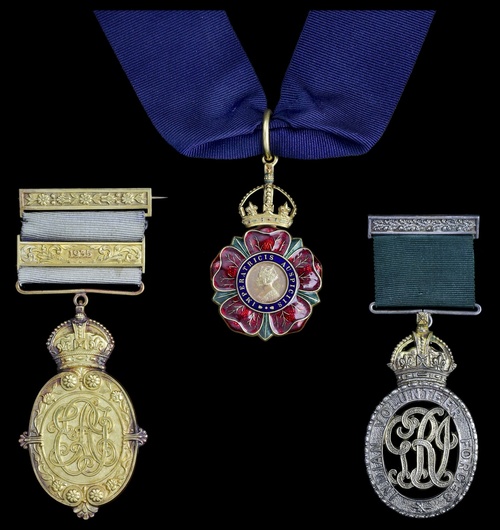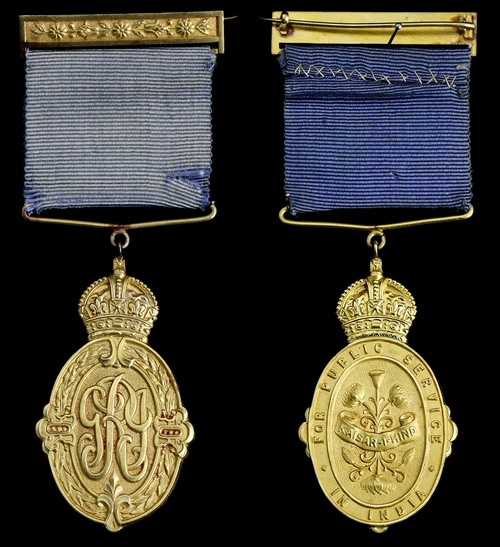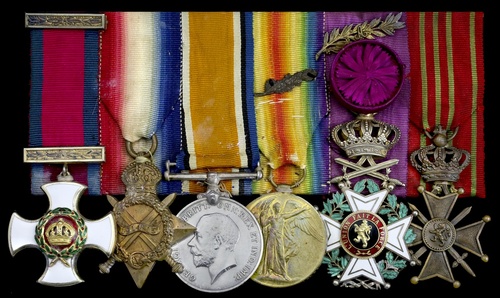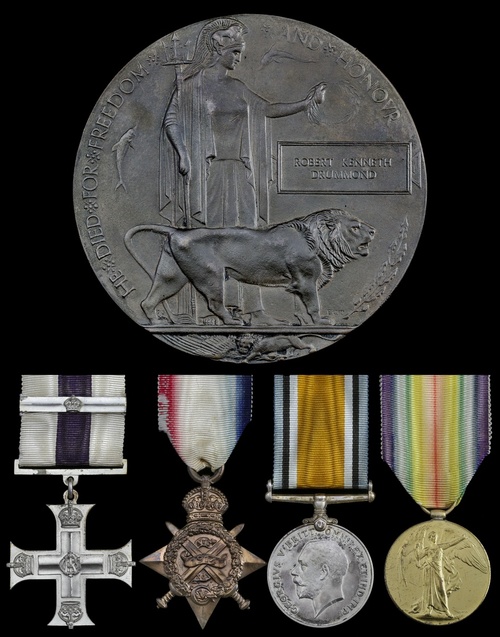(x) Matjiesfontein District Mounted Troop Approximately 46 Medals were awarded to the unit, of which 29 were later returned. 'Cecil John Rhodes once said that he had only met two creators in South Africa: Himself and James Douglas Logan, the Scottish-born founder of Matjiesfontein. Representative in many ways of a grasping late nineteenth century cowboy capitalism that came to reshape and dominate the subcontinent, while holding aloft the flag of 'fair play', 'civilisation' and 'empire', Logan was in the vanguard of an accelerating expansionism at a time when the British bore few doubts about their historic mission.' Empire, War and Cricket in South Africa, Logan of Matjiesfontein, by D. Allen, refers. The important Queen's South Africa Medal awarded to Captain the Honourable J. D. Logan, Commanding Officer of the Matjiesfontein District Mounted Troop, who rose from humble beginnings as a porter with the Cape Province Railway Service to become the 'Laird of Matjiesfontein', a member of the Cape Parliament and what history remembers as the second of the three great benefactors and patrons of South African cricket Queen's South Africa 1899-1902, 1 clasp, Belmont (Capt: Hon: J. D. Logan. Matjesfontein D.M.T.), note spelling of unit, extremely fine James Douglas Logan was born at Reston, a small Berwickshire town close to the English border, on 27 November 1857. His father, James Logan, worked as a ticket clerk for the North British Railway at Reston Station and, following an education at Reston House School, Logan Jnr. was encouraged to follow in his father's footsteps and contribute in what were economically challenging times for the family. Robert Toms, writing in Logan's Way, describes a happy yet 'resourceful' childhood, recounting how the Logan family income was supplemented by poaching - something to which the young James proved more than adept: 'Mr. Logan's family in Reston were rabbit trappers,' recalled a local man many years later, 'and I remember that Mr. Logan apparently got into trouble with the police and was due to appear in court on charges of poaching. He disappeared before court proceedings and went to South Africa.' An apocryphal story, perhaps, but an early indication of the controversial nature of a man whose destiny lay elsewhere. A life no longer 'cabined, cribbed and confined' Feeling confined by the strict norms of the prevalent Victorian society of the times, and hearing stories that in the Colonies there was no aristocracy and no social class - indeed rather there was money for the making for the steadfast of heart - young Logan travelled to London to ponder his next move. As the gateway to Empire, the City introduced him to stories of the rapidly expanding settlements in the Antipodes and he took work as an apprentice aboard the 437-ton sailing vessel Rockhampton on 12 February 1877, bound for Queensland with a general cargo and a number of emigrants. Fate deals its cards The voyage was not a smooth one. Rounding the Cape of Good Hope the ship took a battering from powerful winds and high seas, the condition known locally as 'revolving storms' - with the direction of wind changing frequently, often in an extremely erratic manner. Forced to take refuge in Simon's Town for running repairs, the enforced delay proved frustrating for Logan, more so with no specific time and date for commencement of the voyage. Ashore and contemplating his next step, it is likely that he was quickly swayed by the prosperity on show in the region, not just from the traditional primary industries of copper mining and agricultural endeavours, including wine and brandy, but also that associated with newfound gemstones, especially diamonds. Ever since Erasmus Jacobs, a farmer's boy, found a small, brilliant stone on the banks of the Orange River in 1866, the area had been a focus for those seeking to make their fortune, but things had become even more interesting in 1871 when Esau Damoense, a cook for a prospecting group, chanced
(x) Matjiesfontein District Mounted Troop Approximately 46 Medals were awarded to the unit, of which 29 were later returned. 'Cecil John Rhodes once said that he had only met two creators in South Africa: Himself and James Douglas Logan, the Scottish-born founder of Matjiesfontein. Representative in many ways of a grasping late nineteenth century cowboy capitalism that came to reshape and dominate the subcontinent, while holding aloft the flag of 'fair play', 'civilisation' and 'empire', Logan was in the vanguard of an accelerating expansionism at a time when the British bore few doubts about their historic mission.' Empire, War and Cricket in South Africa, Logan of Matjiesfontein, by D. Allen, refers. The important Queen's South Africa Medal awarded to Captain the Honourable J. D. Logan, Commanding Officer of the Matjiesfontein District Mounted Troop, who rose from humble beginnings as a porter with the Cape Province Railway Service to become the 'Laird of Matjiesfontein', a member of the Cape Parliament and what history remembers as the second of the three great benefactors and patrons of South African cricket Queen's South Africa 1899-1902, 1 clasp, Belmont (Capt: Hon: J. D. Logan. Matjesfontein D.M.T.), note spelling of unit, extremely fine James Douglas Logan was born at Reston, a small Berwickshire town close to the English border, on 27 November 1857. His father, James Logan, worked as a ticket clerk for the North British Railway at Reston Station and, following an education at Reston House School, Logan Jnr. was encouraged to follow in his father's footsteps and contribute in what were economically challenging times for the family. Robert Toms, writing in Logan's Way, describes a happy yet 'resourceful' childhood, recounting how the Logan family income was supplemented by poaching - something to which the young James proved more than adept: 'Mr. Logan's family in Reston were rabbit trappers,' recalled a local man many years later, 'and I remember that Mr. Logan apparently got into trouble with the police and was due to appear in court on charges of poaching. He disappeared before court proceedings and went to South Africa.' An apocryphal story, perhaps, but an early indication of the controversial nature of a man whose destiny lay elsewhere. A life no longer 'cabined, cribbed and confined' Feeling confined by the strict norms of the prevalent Victorian society of the times, and hearing stories that in the Colonies there was no aristocracy and no social class - indeed rather there was money for the making for the steadfast of heart - young Logan travelled to London to ponder his next move. As the gateway to Empire, the City introduced him to stories of the rapidly expanding settlements in the Antipodes and he took work as an apprentice aboard the 437-ton sailing vessel Rockhampton on 12 February 1877, bound for Queensland with a general cargo and a number of emigrants. Fate deals its cards The voyage was not a smooth one. Rounding the Cape of Good Hope the ship took a battering from powerful winds and high seas, the condition known locally as 'revolving storms' - with the direction of wind changing frequently, often in an extremely erratic manner. Forced to take refuge in Simon's Town for running repairs, the enforced delay proved frustrating for Logan, more so with no specific time and date for commencement of the voyage. Ashore and contemplating his next step, it is likely that he was quickly swayed by the prosperity on show in the region, not just from the traditional primary industries of copper mining and agricultural endeavours, including wine and brandy, but also that associated with newfound gemstones, especially diamonds. Ever since Erasmus Jacobs, a farmer's boy, found a small, brilliant stone on the banks of the Orange River in 1866, the area had been a focus for those seeking to make their fortune, but things had become even more interesting in 1871 when Esau Damoense, a cook for a prospecting group, chanced















Testen Sie LotSearch und seine Premium-Features 7 Tage - ohne Kosten!
Lassen Sie sich automatisch über neue Objekte in kommenden Auktionen benachrichtigen.
Suchauftrag anlegen